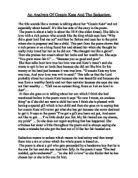English Work – Poetry Exam 16th January 2013
English
Q1) Explore how the writer presents her ideas about death in ‘Conscientious Objector’. (15)
The poem ‘Conscientious Objector’ by Edna St. Vincent Millay is a poem based on the cruelty of war. It was written during the Second World War, at a time where conscientiousness was a moral standard. The narrator expresses her opinion towards the expected behaviour of society, and how she objects towards it.
The language used in the poem has a significant impact on the way it is perceived. Death is used as an obstacle in the poem. The beginning line involves the noun ‘Death’, which immediately insinuates that death is a person; a living thing. This is used to create a sense of fear of death and let readers know he cannot be escaped; she will not succumb to his temptations. This relates to the narrator’s strong beliefs and chivalrous attitude, 'I shall die, but that is all I shall do for death.' She is determined and resilient. There is also an idea of torture being taken lightly, 'Though he flick my shoulders with his whip.' A whip is a harsh, tormenting weapon. The verb ‘flick’ presents the pain as mild and the narrator mocks Death’s attempts of torture. This is also used ironically, as a whip would usually cause a great deal of anxiety and excruciating pain. Millay does this to show that death and torture is taken lightly.
The poem suggests that death is plentiful, 'He is in haste; he has business in Cuba, business in the Balkans'. This presents a rushed idea towards Death. There are no sorrows or regrets, and Death has a myriad of places to go without time to waste. This gives the impression that Death occurs all the time for the narrator; it is ordinary and nothing abnormal, Death does not make connections. The writer uses this to create a subtle, matter-of-fact tone which is effective in persuading the reader that the writer lives in a harsh, cruel world. This emphasises the fact that death is not emotionally involved.
The structure of the poem is used to mirror the theme of Death. From the first person narrative, it is made clear that the poem is a monologue. This implies the ideas conveyed are somewhat biased and not common to everyone. 'I am not on his payroll' perhaps others are, particularly ones serving in the army. The writer seems to show disgust towards taking the life of another, which is the role of a soldier in an army. Millay uses this to relate to the consequences of being ‘conscientious’, practically suggesting that serving in the military is a ‘one-way ticket’ to Death. Taking the life of another is a malevolent act, and doing so is an example of cowardice and fear.
The final stanza of the poem is a quatrain, differing from the other stanzas of the poem. This is used to make it stand out, as it essentially contains the most important message of the poem. 'I will not tell him the whereabouts to my friends and enemies' relates to the narrator’s perseverance, especially due to the noun ‘enemy’, since enemies could be people one would welcome death upon. This stanza follows a chiastic structure to emphasise the message it conveys, ‘I will not tell him the whereabouts of my friends nor enemies either’ holds the same message as the line following. This increases the effect and importance of the message presented, and gives the implication it is the climax of the poem. Death is not something to wish upon enemies.
There seems to be no specific rhyme scheme used in Conscientious Objector. This produces a more serious tone, which indicates a subject of sorrowful importance. This relates towards the theme of death, as it is not a topic to joke about. The narrator uses the tone to discuss the more serious matters of death; 'With his hoof on my breast' presents the idea of torture and terror. The narrator’s strong beliefs are reinforced by her virtuous behaviour, and although the opposing force of Death is discomforting, she does not change her opinion.
Overall, Millay presents her ideas towards Death effectively and analytically. There are a variety of different poetic devices within the text which support the narrator’s views towards Death, and her attempts to avoid any physical encounter with him. However, the narrator does seem to hold biased opinions towards Death, which causes the poem to seem more personal to the readers.








